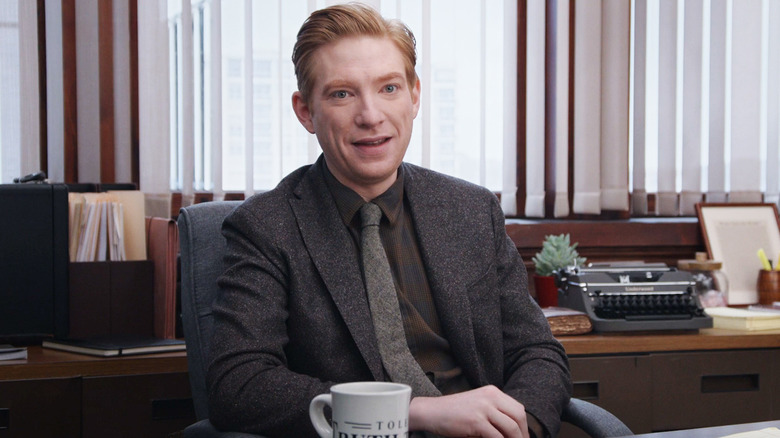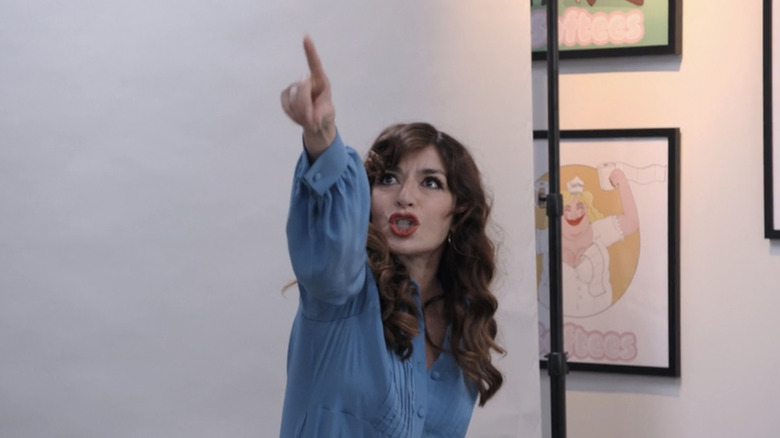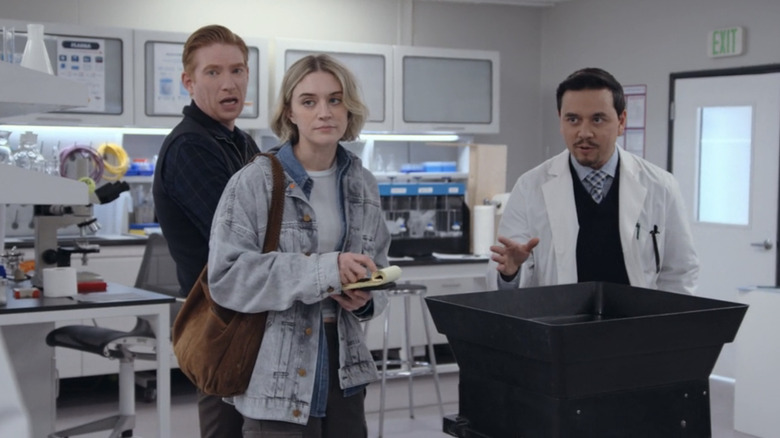The Paper Season 1 Has Us Asking One Question
"The Paper" has brought viewers back to the "Office" universe with a long-awaited spin-off that's really only tenuously linked to the previous series. In reality, it didn't need to be associated at all. Indeed, beneath the "Office" associations, "The Paper" is a show that could easily flourish on its own terms, to the extent that by the end of the first season, I couldn't help but ask: Why is this even an "Office" spin-off?
During the final season of "The Office," NBC halted plans for a Dwight-led spin-off titled "The Farm," which was a good decision since it would've ruined the show's happy ending. After footage for the pilot was shot, the network then decided to kill the spin-off altogether, which led to extra scenes being filmed in order to turn the footage into an episode of "The Office" season 9 (which, again, judging by the critical reaction to that episode itself, was likely for the best). After that, "Parks and Recreation" almost became a spin-off of "The Office" as well, with showrunner Greg Daniels spearheading what was initially supposed to be a series set in the same universe (but which ultimately became its own thing).
Now, we have "The Paper" — the first "Office"-like series to actually be set in the same universe as that show. In fact, this new series is directly connected to "The Office" in that it focuses on the staff of the Toledo Truth Teller, who are now being filmed by the same fictional documentary crew that spent years chronicling the lives of the employees at Dunder Mifflin's Scranton branch. But the more I watched "The Paper," the more I felt as though its creators had shot themselves in the foot with the "Office" association — not only with the mockumentary conceit, which requires a certain level of believability, but also by weighing down a show that is clearly its own thing with all the baggage that comes with resurrecting one of the best sitcoms of all time.
What does the mockumentary format mean in 2025?
While there have been some truly great mockumentaries, the format has become bastardized over time, weakening a whole host of series that would've been perfectly okay had they been shot like a traditional sitcom. The U.K. "Office" took the mockumentary approach seriously enough that it helped heighten the sense that we were getting a glimpse at real office life in 2000s-era Britain. It was only against this believably drab backdrop that Ricky Gervais' relentlessly feckless David Brent worked so effectively. When the U.S. version of the series debuted, it too seemed to take its fake documentary setup seriously, which is partly why the Jim (John Krasinski) and Pam (Jenna Fischer) relationship was so meaningful and touching. These felt like real people in a real place being shot by a real documentary crew, and that was fertile ground to tell a hilarious and emotionally resonant story that spoke not only to those who felt similarly oppressed by the modern-day office environment, but who could also recognize the beauty of a love story flourishing amid cubicles and fluorescent lights.
Then, every show on TV started aping the same style, except now the mockumentary format had become a series of visual tropes rather than an actual storytelling device. Scenes shot through blinds and door frames, quick zooms and pans, hand-held judder; these tropes resulted in shows that all looked like "The Office," but something was off. Series that included scenes that a documentary crew would never actually have access to started to raise the question of whether they needed a pseudo-documentary approach in the first place. This began with "Parks and Recreation" but that beloved series made it work, partly because it came at the very beginning of this obsession with the style. In 2025, however, these mockumentary pastiches have become so parodic they're starting to feel like they're entering the same outdated territory as multi-camera laugh track sitcoms. That's a real shame for "The Paper" because it's coming out the gate at a disadvantage to its predecessor. It can never hope to match the freshness that characterized the early "The Office" seasons by using an overused style. But beyond that, it also feels like it so desperately wants to break free of its fictional documentary crew, except it can't due to its association with "The Office."
This comes across through the characters in "The Paper," who are a little less realistic and a little more cartoonish than their "Office" counterparts. Sabrina Impacciatore's Esmeralda Grand is a prime example, but even Ned Sampson (Domhnall Gleeson) has his moments, especially in an episode where we see footage of his past as a salesman and his entire characterization as a humble and well-intentioned dreamer seems to go out the window in the pursuit of a laugh. That would be much easier to take in a show that wasn't ostensibly made up of footage shot by a documentary crew. It might also be funnier in a show that contrasted the zanier characters against the more subdued, realistic ones but "The Paper" can't seem to decide which one it wants to be, and much of that comes from its attachment to "The Office." Clearly, the new show is populated by individuals that want to be wilder and more theatrical than both those of its predecessor and the quasi-realistic tone required by the mockumentary format. All of this once again raises the question: Why is this even an "Office" spin-off?
The Paper should have been its own show
"Parks and Recreation" is a good example of a great show that had a rough first season, and much of that came down to the series trying too hard to recreate "The Office." Amy Poehler's Leslie Knope started out as what was essentially a female version of Steve Carell's Michael Scott, but "The Paper" thankfully doesn't make that same mistake, introducing an ensemble where nobody is an obvious analogue of a previous "Office" character. But it also fails to take the standalone spirit to its ultimate conclusion. Unlike "Parks and Rec," which hit its stride once it abandoned any attempts to emulate "The Office," "The Paper" is still beholden to its mothership series in a way that feels limiting.
It's worth noting that "Parks and Rec" also had an optimistic and heartfelt outlook similar to that of "The Paper." This is best exemplified by the character of Ned Sampson, who, although he can be misguided and lack self-awareness, is ultimately a hopeful optimist with romantic ideas of restoring the Toledo Truth Teller to greatness and returning to a time of real hard-hitting journalism. But with the shadow of "The Office" hanging over this first season, Ned always feels as if he's struggling to match the comedic value of Michael Scott. Whether co-creator Greg Daniels and co. like it or not, the show's mere association with "The Office" is going to cause viewers — subconsciously or otherwise — to draw the comparison, and Sampson just isn't that character. Had the show been allowed to just exist on its own, this would be much less of an issue.
The best seasons of "The Office" (i.e. the ones before Steve Carell left) managed to find that balance between believability and comedy, but "The Paper" clearly wants to do its own thing without worrying about striking that balance. The only problem is, it sort of has to because it's an "Office" spin-off. If its creatives just let this show be its own thing, it could shine on its own terms. Unfortunately, after watching its first 10 episodes, I couldn't shake the feeling that it was hemmed in by its association with the former series and its mockumentary style. When you consider that this is mostly just a loose spin-off which doesn't really carry over anything major from the original show, you really do start to wonder what the point of this being a spin-off was to start with. None of this will stop the show from evolving in its now-confirmed second season, but had it been introduced as a standalone series, it might have felt like it was hitting its stride right out of the gate.
"The Paper" season 1 is now streaming on Peacock, with season 2 most likely arriving in 2026.


